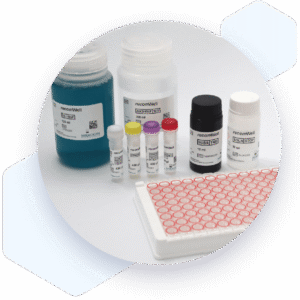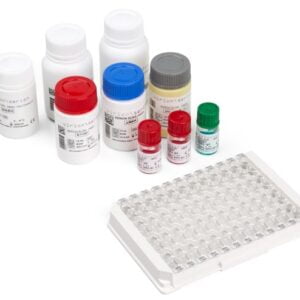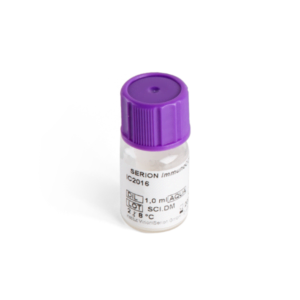| Weight | 1 lbs |
|---|---|
| Dimensions | 9 × 5 × 2 in |
| target | Yersinia reactive IgA |
| species reactivity | Yersinia |
| applications | ELISA |
| assay type | Indirect & quantitative |
| available sizes | 96 tests |
Yersinia IgA ELISA Kit ESR138A
$398.00
Summary
- Virion/Serion Diagnostic Kit for research use (RUO)
- Yersinia IgA ELISA Kit
- Suitable for IgA detection
- Ready-to-use
- 96 tests
Yersinia IgA ELISA Kit ESR138A
| kit | ||||||||||||||||||
|---|---|---|---|---|---|---|---|---|---|---|---|---|---|---|---|---|---|---|
| Assay type Indirect ELISA | ||||||||||||||||||
| Research area Infectious Disease | ||||||||||||||||||
| Sample type Serum, plasma, whole blood | ||||||||||||||||||
Components
| ||||||||||||||||||
| Storage Store at 2-8°C. | ||||||||||||||||||
| Associated products Yersinia enterocolitica o-8 YOP (Yersinia outer proteins) Antigen (BA13808VS) Yersinia enterocolitica o-9 YOP (Yersinia outer proteins) Antigen (BA13809VS) Yersinia enterocolitica o-3 YOP (Yersinia outer proteins) Antigen (BA138VS) Yersinia IgA Control Serum (BC138A) Yersinia IgG Control Serum (BC138G) Yersinia IgM Control Serum (BC138M) Yersinia IgA ELISA Kit (ESR138A) Yersinia IgG ELISA Kit (ESR138G) Yersinia IgM ELISA Kit (ESR138M) |
| target relevance |
|---|
| Organism Yersinia enterocolitica |
| Protein names Yersinia |
| Structure and strains Yersinia enterocolitica is a Gram-negative, rod-shaped bacterium, belonging to the family Yersiniaceae. It is motile at temperatures of 22 29°C (72 84°F), but becomes nonmotile at normal human body temperature. Y. enterocolitica infection causes the disease yersiniosis, which is an animal-borne disease occurring in humans, as well as in a wide array of animals such as cattle, deer, pigs, and birds. Many of these animals recover from the disease and become carriers; these are potential sources of contagion despite showing no signs of disease. The bacterium infects the host by sticking to its cells using trimeric autotransporter adhesins. |
| Detection and diagnosis The use of sensitive and specific ELISA with quantitative determination of IgG, IgM and IgA antibodies is the method of choice for a clear differentiation between acute and chronic yersiniosis. The determination of the individual antibody activities is important for the differential diagnosis of post-infectious sequelae such as rheumatoid arthritis or erythema nodosum. Following the normal course of an acute Yersinia infection, IgG antibody activity often persists for several years while the IgA and IgM antibody activities decrease within a few months post infection. By contrast, in the case of postinfection complications, the IgA antibody activity remains elevated for years. |
Data
Publications
| pmid | title | authors | citation |
|---|---|---|---|
| We haven't added any publications to our database yet. | |||
Protocols
| relevant to this product |
|---|
| ESR138A protocol |
Documents
| # | ||
|---|---|---|
| Please enter your product and batch number here to retrieve product datasheet, SDS, and QC information. | ||
Only logged in customers who have purchased this product may leave a review.




Reviews
There are no reviews yet.